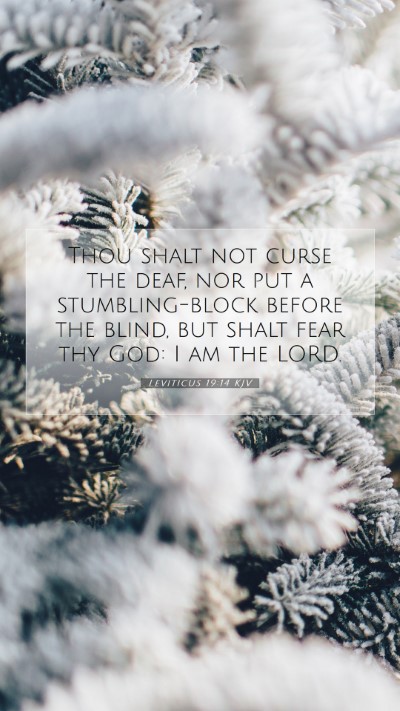Understanding Leviticus 19:14
Leviticus 19:14 states: "You shall not curse the deaf, nor put a stumbling block before the blind, but shall fear your God: I am the LORD." This verse emphasizes the principles of justice, empathy, and reverence towards God. As we delve into this scripture, we find profound insights that inform our understanding of community ethics and interpersonal conduct.
Bible Verse Meanings
This verse carries significant meaning as it highlights the moral responsibility of individuals towards the vulnerable members of society, particularly those who cannot defend themselves.
1. Ethical Conduct Towards Others
Matthew Henry emphasizes that this scripture condemns malicious behavior. Just as one would not harm a person who is incapable of defending themselves (the deaf or blind), we ought to act with integrity towards everyone.
2. Fear and Reverence for God
Albert Barnes illustrates that the call to "fear your God" serves as an imperative to act righteously. Our treatment of others is directly linked to our reverence for God, reinforcing the notion that ethical behavior towards fellow humans reflects our relationship with the divine.
3. Community Responsibility
Adam Clarke notes that the verse calls for a communal sense of responsibility. It is a reminder that society is accountable for the well-being of its members, especially those with disabilities. This assertion reflects the biblical principle of loving one’s neighbor.
Key Themes and Insights
- Empathy: The call to not curse the deaf or place stumbling blocks for the blind conveys a powerful message of empathy. We should understand the struggles of others and behave accordingly.
- Justice: The prohibition against causing harm or distress to those unable to protect themselves underscores the biblical emphasis on justice.
- Reverential Fear: The passage concludes with a reminder of God's holiness, signaling that our ethical behavior should stem from a place of reverence and a desire to please God.
Applying this Verse to Daily Life
Understanding this verse prompts reflection on how we interact with others in our daily lives. Here are some applications:
- Practice kindness and refrain from making jokes or comments at the expense of others’ vulnerabilities.
- Advocate for those who cannot advocate for themselves, ensuring their rights and dignity are respected.
- Encourage inclusive practices in your community that allow all individuals to participate fully.
Cross References
This verse connects with various other biblical passages, which enhance its meaning:
- Exodus 23:1-3: A reminder not to spread false reports or side with the wicked.
- Proverbs 31:8-9: An exhortation to speak up for those unable to speak for themselves.
- Matthew 22:39: Jesus summarizes the law as loving your neighbor as yourself.
Conclusion
This exploration of Leviticus 19:14 guides the seeker toward a deeper understanding of Scripture and the social implications of living a life that honors God by serving others. By studying this verse, we grasp valuable lessons on morality, community care, and the essential nature of our interactions with all individuals.
Keywords: Bible verse meanings, Bible verse interpretations, Bible verse understanding, Bible verse explanations, Bible verse commentary, scripture analysis, biblical exegesis, Bible study insights.


